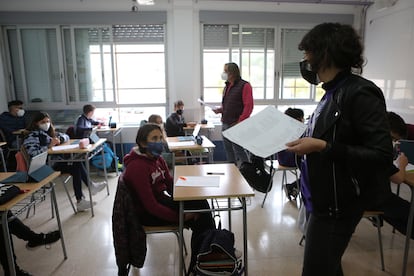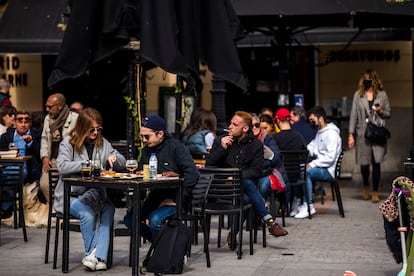Spanish scientists demand ‘urgent’ action to curb airborne transmission of coronavirus
Over 100 health professionals are urging Spain’s central and regional authorities to take steps to prevent aerosol infection in poorly ventilated indoor settings

Since the start of the pandemic over a year ago, scientists have given us tools to fight the coronavirus, providing evidence that mixing indoors is far riskier than outdoors; and that ventilation plays a decisive role. But a group of more than 100 scientists and healthcare professionals believe this knowledge is not being sufficiently exploited.
“Despite the clarity of the scientific conclusions, the implementation of these measures is proving extraordinarily slow, and it is often carried out partially or incorrectly,” they write in a letter to Spain’s central and regional authorities, first published by EL PAÍS.
The letter was signed by over 100 individuals, including eminent virologists, heads of hospital emergency services and public health experts who stress the importance of combating transmission caused by inhaling tiny airborne virus particles – aerosols – which is one of the three main causes of infection recognized by science, along with direct contact with droplets produced by positive cases and touching contaminated surfaces, which is now said to be less likely.
“Given the seriousness of the situation, we believe it is urgent to take advantage of the knowledge available to us and for government agencies to promote the necessary preventive measures to reduce the risk of infection from Covid-19 through inhalation. We are convinced that the benefits will be enormous,” insist the authors.
Masks, ventilation, information
These scientists propose eight courses of action that should be implemented “as soon as possible.”
“We believe there is still time to ensure widespread deployment of the available preventive measures,” the signatories point out. The letter focuses on the scientific evidence concerning the significant role that aerosols play in transmission. To combat this mode of transmission, masks should be worn, physical distance should be maintained and indoor ventilation guaranteed, but the authors believe the Spanish authorities could do more to ensure these measures are applied and properly understood by the public.

The first issue the scientists would like to see tackled is the use of masks. Although mask-wearing has become second nature to residents of Spain, there are aspects that need to be addressed: masks that do not work properly should be taken off the market, their use in the workplace should be enforced and the importance of fitting them correctly and not leaving gaps should be stressed. “We estimate that flaws in the actual use of masks reduce their effectiveness to less than half, which translates into a huge number of infections that could be avoided,” state the authors.
The letter goes on to call for one of the most obvious measures to be taken seriously – moving as much activity as possible outdoors, where the possibility of infection is one-twentieth of what it is indoors.
The experts are also calling for greater emphasis on indoor ventilation. They want people to be properly informed and made aware that it must be done on a continuous basis, suggesting CO2 monitors be used to measure how adequately a place is ventilated.
We estimate that flaws in the actual use of masks reduce their effectiveness to less than halfLetter to Spanish authorities signed by more than 100 scientists and healthcare professionals
Also proposed are a number of air-cleaning devices. However, “there is confusion about their effectiveness, recommendations for use and possible risks,” which the signatories urge the authorities to clarify by laying out criteria, procedures and regulations.
It is also stated that special attention should be paid to the needs of schools on account of their vulnerability.
Finally, the letter calls for effective communication concerning the basics of coronavirus transmission and preventive measures. “It is essential for the public to understand the logic of the rules issued by the authorities and to be able to work out for themselves what would be ideal behavior in any given situation,” the authors point out. Citizens would then be able to better protect themselves, knowing which elements produce a high-risk environment.
The letter is signed by over 100 individuals, including Adolfo García Sastre, director of the Global Health and Emerging Pathogens Institute; Antonio Alcamí and Margarita del Val of the Center for Molecular Biology at the National Research Council (CBM-CSIC); Julio Cobo, head of the emergency services at La Paz Hospital in Madrid, and Santiago Moreno, head of the infectious diseases unit at Ramón y Cajal Hospital in Madrid. There are also public health experts such as Jeffrey Lazarus of ISGlobal, environmental health specialists such as María Cruz Minguillón of the Institute of Environmental Assessment and Water Research (IDAEA-CSIC), and other scientists such as Juan José Badiola, director of the Center for Emerging Communicable Diseases, and José Luis Jiménez, professor of Environmental Sciences at the University of Colorado.
English version by Heather Galloway.
Tu suscripción se está usando en otro dispositivo
¿Quieres añadir otro usuario a tu suscripción?
Si continúas leyendo en este dispositivo, no se podrá leer en el otro.
FlechaTu suscripción se está usando en otro dispositivo y solo puedes acceder a EL PAÍS desde un dispositivo a la vez.
Si quieres compartir tu cuenta, cambia tu suscripción a la modalidad Premium, así podrás añadir otro usuario. Cada uno accederá con su propia cuenta de email, lo que os permitirá personalizar vuestra experiencia en EL PAÍS.
¿Tienes una suscripción de empresa? Accede aquí para contratar más cuentas.
En el caso de no saber quién está usando tu cuenta, te recomendamos cambiar tu contraseña aquí.
Si decides continuar compartiendo tu cuenta, este mensaje se mostrará en tu dispositivo y en el de la otra persona que está usando tu cuenta de forma indefinida, afectando a tu experiencia de lectura. Puedes consultar aquí los términos y condiciones de la suscripción digital.









































